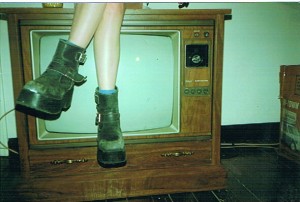Let’s hope the following statement about TV from the 1993 David Foster Wallace essay, “E Unibus Pluram: Television and U.S. Fiction,” isn’t true anymore. Perhaps the marginalization of TV in a multi-platform media world has made programmers more desperate, more willing to give us bread and circuses in a desperate attempt to attract viewers. But what if it still is true? What then?
••••••••••
“If we want to know what American normality is – what Americans want to regard as normal – we can trust television. For television’s whole raison is reflecting what people want to see. It’s a mirror. Not the Stendhalian mirror reflecting the blue sky and mud puddle. More like the overlit bathroom mirror before which the teenager monitors his biceps and determines his better profile. This kind of window on nervous American self-perception is just invaluable, fictionwise. And writers can have faith in television. There is a lot of money at stake, after all; and television retains the best demographers applied social science has to offer, and these researchers can determine precisely what Americans in 1990 are, want, see: what we as Audience want to see ourselves as. Television, from the surface on down, is about desire. Fictionally speaking, desire is the sugar in human food.”
••••••••••
Tags: David Foster Wallace

